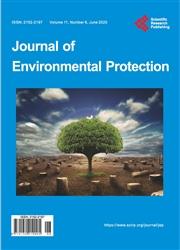Investigation of the Radiological Risk of Farmlands and the Transfer Factor from Soil to Crops in Jalingo and Wukari L.G.A of Taraba State, Nigeria
引用次数: 3
Abstract
The activity concentrations of radionuclides, absorbed dose rate, excess lifetime cancer risk, and soil-to-plant transfer factor have been evaluated in soil and crop samples from Jalingo and Wukari Local Government Area of Taraba State, Nigeria. The activity concentrations were determined with the aid of High Purity Germanium detector. The absorbed dose and excess lifetime cancer risk were evaluated and forecasted for 60 years using the ResRad off-site model. The average activity concentration of 40 K, 232 Th, and 238 U in the soil samples were 633.13, 141.15, and 71.20 Bq∙kg −1 respectively, for the Jalingo study area, and while that of the Wukari study area was; 199.21, 87.23, and 25.37 Bq∙kg −1 respectively. The average soil-to-plant transfer factors for 40 K, 232 Th, and 238 U were 0.51, 0.10, and 0.27 respectively for the Jalingo study area while that of Wukari are 0.40, 0.57, and 0.74 respectively. The mean annual effective dose equivalent for the study area is higher than the world average of 0.07 mS∙vy −1 . The excess lifetime cancer risk for the study areas has values that are higher than the safety limit. The ResRed model showed that direct radiation from the crops is the major contributor to excess cancer risk among other pathways. The radiological hazard indices reveal health risks to farmers, especially in the Jalingo area.尼日利亚塔拉巴州Jalingo和Wukari L.G.A农田辐射风险及土壤向作物转移因子调查
对尼日利亚塔拉巴州Jalingo和Wukari地方政府地区的土壤和作物样本进行了放射性核素活性浓度、吸收剂量率、超额终身癌症风险和土壤到植物转移因子的评估。用高纯锗检测器测定活性浓度。使用ResRad非现场模型评估和预测60年的吸收剂量和超额终身癌症风险。Jalingo研究区土壤样品中40 K、232 Th和238 U的平均活性浓度分别为633.13、141.15和71.20 Bq∙kg−1,Wukari研究区土壤样品中40 K、232 Th和238 U的平均活性浓度分别为633.13、141.15和71.20 Bq∙kg−1;分别为199.21、87.23和25.37 Bq∙kg−1。Jalingo研究区40 K、232 Th和238 U的平均土壤-植物转移因子分别为0.51、0.10和0.27,Wukari研究区40 K、232 Th和238 U的平均土壤-植物转移因子分别为0.40、0.57和0.74。研究区年平均有效剂量当量高于0.07 mS∙vy−1的世界平均水平。研究区域的终生癌症风险值高于安全限值。ResRed模型显示,在其他途径中,来自农作物的直接辐射是导致癌症风险过高的主要因素。放射性危害指数揭示了农民面临的健康风险,特别是在Jalingo地区。
本文章由计算机程序翻译,如有差异,请以英文原文为准。
求助全文
约1分钟内获得全文
求助全文

 求助内容:
求助内容: 应助结果提醒方式:
应助结果提醒方式:


